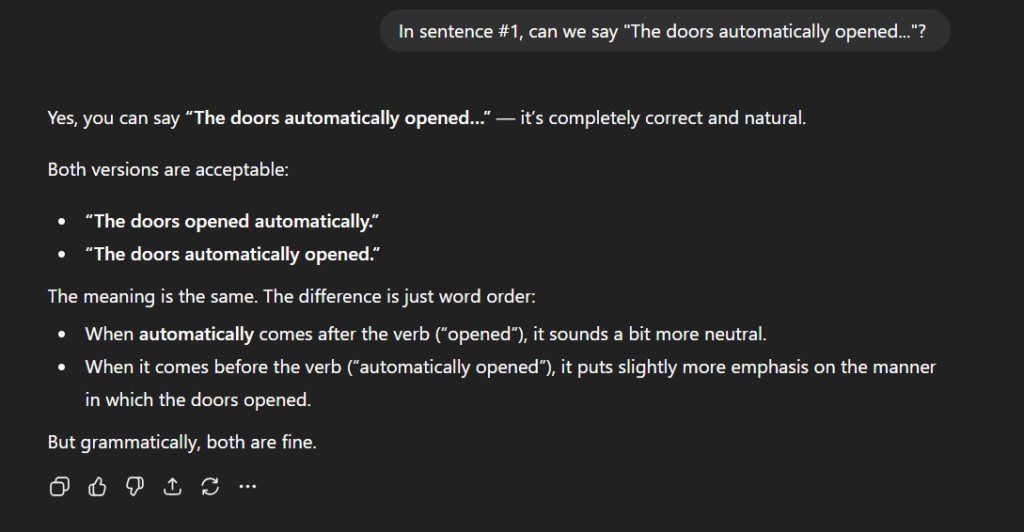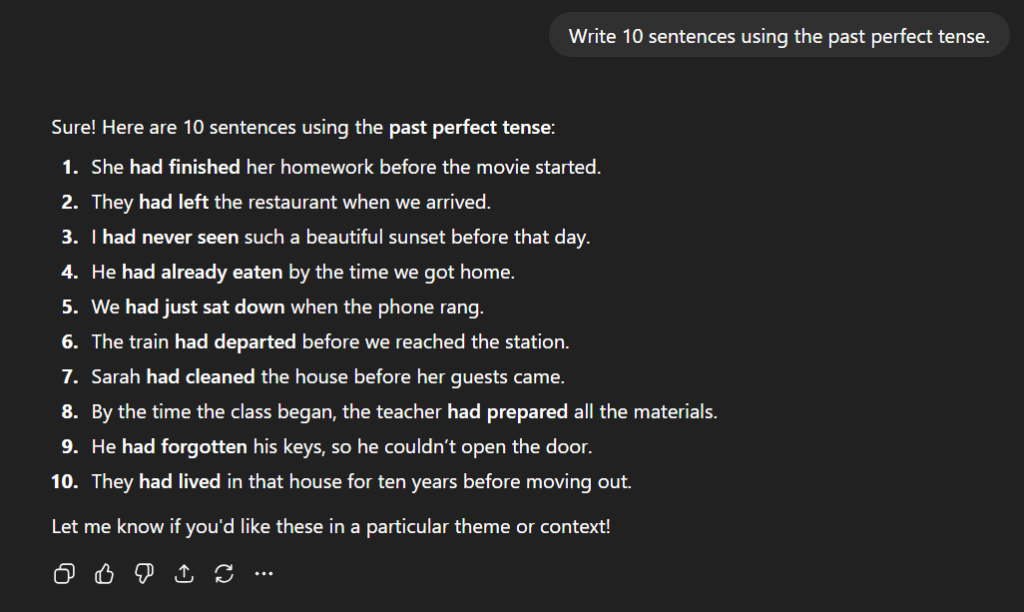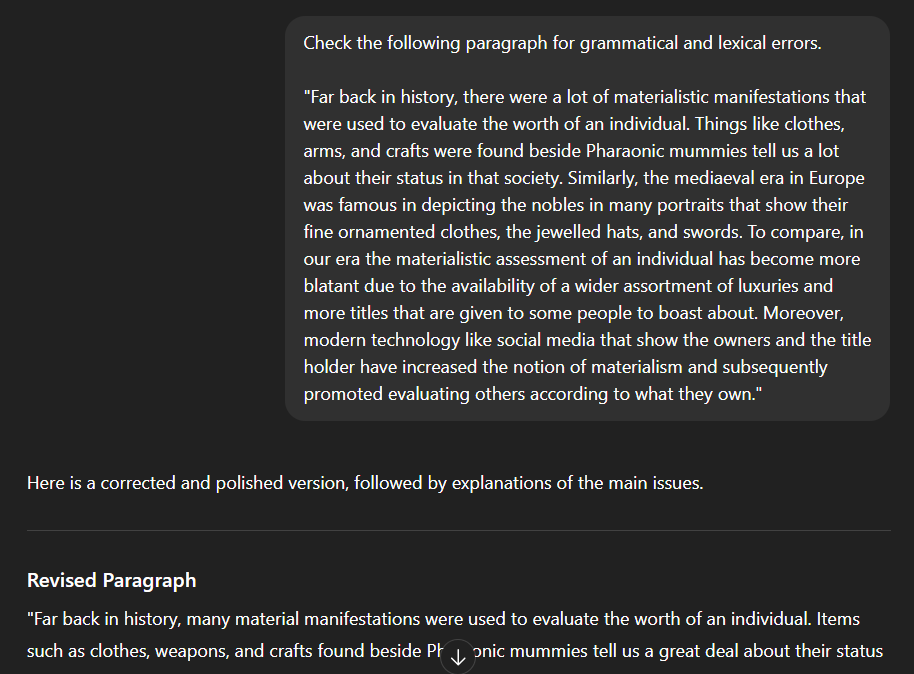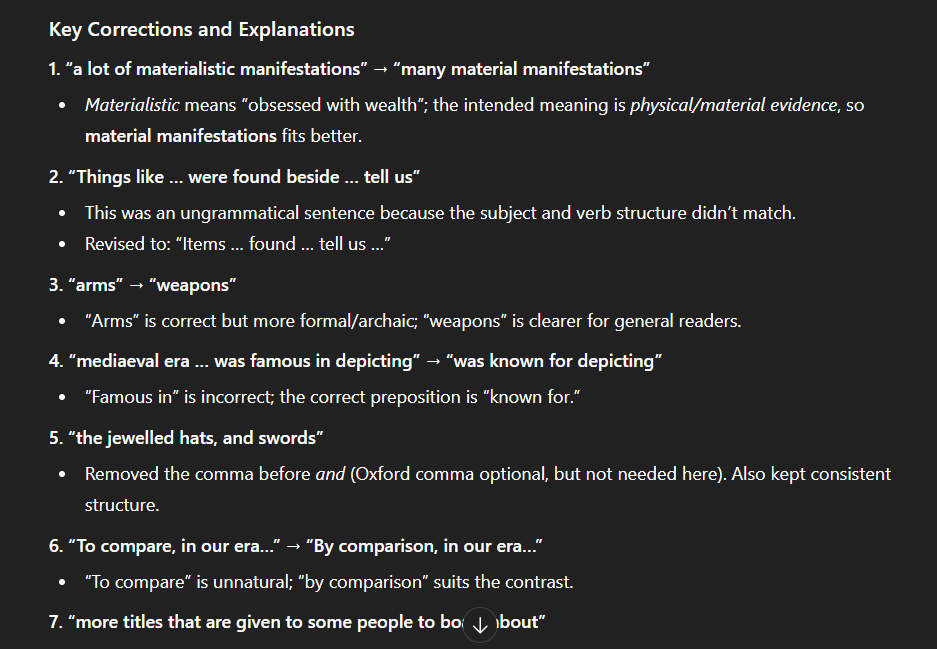A lot of people ask me about using AI to learn English and so I thought I’d make a really quick lesson about it. Actually, I wrote an article a few years ago, but so much has changed that it’s pretty much outdated. Back then, AI had some great capabilities but it was still very limited and tended to fail in many aspects… But what about now? Can you realistically use AI to learn English?
The answer is YES but you do need to be smart in how you use it and be aware of its limitations. I suppose that’s true about almost anything, but people put too much faith in things like ChatGPT these days.
One way that I think can benefit all English learners is to use it for learning vocabulary. There are many ways you can use it, but I think one really handy way is to tell it things like “Write 10 sentences using [a certain word].”
Go to your preferred AI program and type that prompt. I’ll use ChatGPT here because I think it’s the most common one.
Let’s take the word “automatically” as an example. I would type this prompt.
- Write 10 sentences using “automatically.”
ChatGPT will give you ten sentences that include this and it tends to vary those so that you can see different ways that the word might be used. This is really useful for seeing how a word is used in relatively natural language.

Sometimes you get sentences that are slightly strange, but these are all perfectly fine. Also, with each passing month the language gets better and so the example sentences will be more natural.
What’s important is that you can then ask follow-up questions. You can ask what exactly one sentence meant or whether a word could be used in a different part of a sentence. You might see another word used and ask for a simple explanation of its meaning. It’s a great idea to ask questions like, “Why did you say ____?” or “Can we change sentence #2 to use this word?” You could ask why “automatically” appears before a verb and whether it’s possible to move it elsewhere in a sentence.
For example:

You can also ask it to give you synonyms, which are similar words, or to give you related words, such as “automatic” and “automated,” then you can learn sentences in which these can be used.

In this sense, you are turning AI into your own personal teacher. It’s much more detailed and flexible than a textbook and unlike a teacher it is completely free and never loses its patience. It’s also extremely fast and won’t hesitate to give you hundreds of examples if that’s what you need to really learn something. A human teacher like me will run out of ideas pretty soon.
Of course, learning should be an involved process. The more energy you invest, the more you will learn, so don’t just give it one prompt and accept the results unless you really do need one quick answer. Use it to essentially make your own lessons. Spend time really digging into this vocabulary point and learning it as best you can, just like you would do in a real classroom.
The great thing about AI is that you can also ask it for learning advice. You can even ask it how you can use it effectively!
One good idea is to have the AI program test your knowledge once you think you have learned these words or phrases. You can use something like my prompt here:

It’s not just vocabulary that AI can help you with. You can use it for grammar as well. You could say:
- Write 10 sentences using the past perfect tense.

Again, you can ask follow-up questions and this is where the real learning happens. You can ask things like “Why do we use X in question 5?” The AI program will explain it and if it’s still too difficult, you can get it to explain more and more. Whereas a human teacher may grow impatient, ChatGPT, Gemini, and other AI programs will happily answer hundreds of questions.
Here is a good example of a question that can help you to learn. I must admit that ChatGPT has done a good job of explaining the difference between past perfect and present perfect here:

Again, it helps to approach this like a real English lesson. The more you put in, the more you get out. Ask questions, make notes, and for the best results, try writing sentences and asking for feedback. This will help you learn much faster. (For a bonus tip, I really do recommend making notes using old-fashioned pen and paper. That’s because science shows that our brains remember things better that way. When you use technology to speed up the learning process, it’s important to remember that some of the old methods are still necessary.)
I should mention here that I’ve now given two examples where I said “Write 10 sentences…” Why is that? This is a good, manageable number. Of course, you could say “Write 50 sentences using a certain word or grammatical structure,” but it won’t help you as much. There’s just too much information to process. It’s better to start with 10 sentences and then study them, asking questions where necessary, and you can always ask for more examples after that. Make sure you understand the first 10 sentences and the core concepts before moving on.
Another handy tip is to get the AI program to summarise what it’s told you. After all, if you have a big learning session and there are lots of example sentences and explanations, it can be a little overwhelming. It’s a good idea towards the end to have some sort of neat summary that you can refer to later.

You can also use AI to check your writing, but I do urge some caution here because whilst it is very useful, it may also give some bad advice. Make sure that your prompts are specific. Get it to focus on your vocabulary or grammar rather than telling it simply to “correct” or “check” what you’ve written. Sometimes having too much feedback is not a good thing. And once again, if it makes a correction then you should use it to ask further questions so that you really understand what it means.
Let’s look at an example. I might give it the following sentence.


You can use this with sentences, paragraphs, or whole essays. It really depends on you. With a whole essay, it might be hard to really internalise all the feedback. As you can see from my answer here, it’s already quite a lot of information to take in. A human teacher would probably be more selective and make corrections that are easier to see.
If you want your essays professionally checked, you can use my writing correction service.
You should be careful if you are studying for a specific test like IELTS, though. Because AI is pulling its ideas from the internet, sometimes it will give you bad advice if that advice is commonly found online. Last year, someone sent me some IELTS essays that AI had corrected and they were really bad. I recognised that the AI program had tried to use lots of obscure vocabulary in order to impress the examiner but this just made the essay sound strange and incoherent. It also struggled a lot with certain parts of the marking criteria although these days it would be better due to advancements in AI systems and how they process ideas. I still would not recommend asking it to give you a band score because that requires a human intelligence that AI does not yet possess. Two years ago, there were lots of free AI essay checkers appearing and I tested them. They would assign a band 6 to a band 9 essay and tell me that a band 9 essay was worth band 6! In other words, they were terrible. However, the technology is improving rapidly and maybe they are better now.
In any case, you should be careful about a few things. I’ve given you some useful advice but please be aware of the limitations of this technology. Even the best AI programs frequently make mistakes. They are good enough as of late 2025 to use for learning purposes but don’t assume that everything they tell you is 100% true.


![Family and Friends [IELTS Topic]](https://ted-ielts.com/wp-content/uploads/2019/04/family-ielts_shx9hh-440x264.jpg)
![Describe your Favourite Singer [IELTS Speaking]](https://ted-ielts.com/wp-content/uploads/2021/12/Describe-your-Favourite-Singer-440x264.png)




In Cambridge IELTS 20, there are a lot of new and a bit ‘unusual’ writing tasks, including both task 1 and 2. If you have the time, I would be very grateful if you could create lessons on them.
Thank you
That’s a good idea. Thanks. I will try to make an article on it in January.